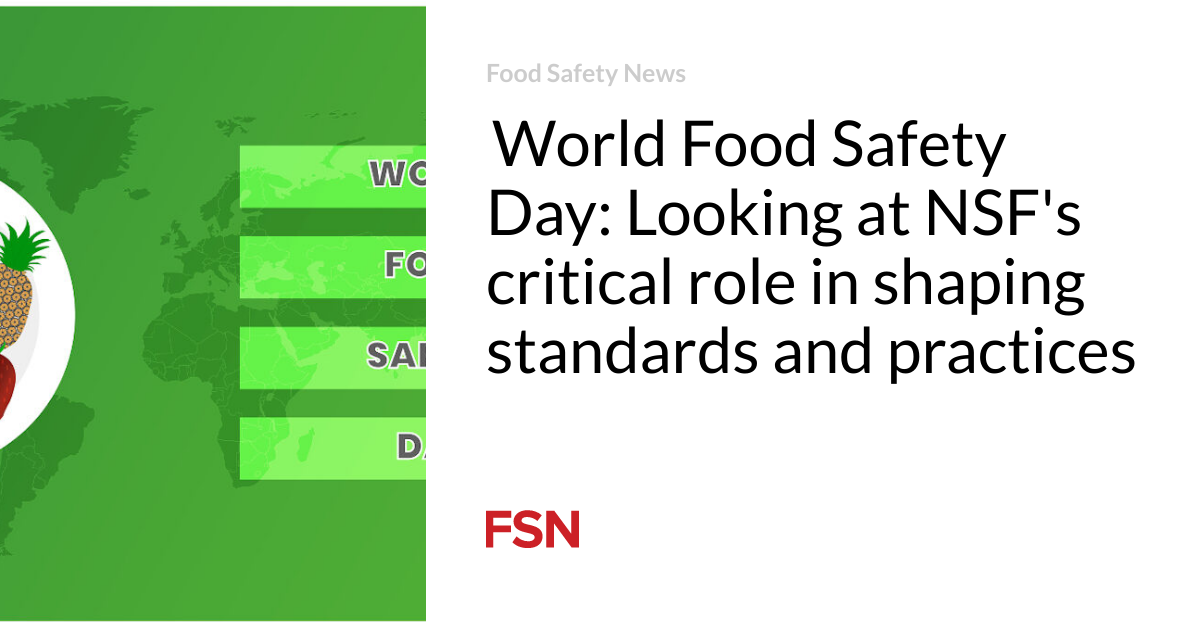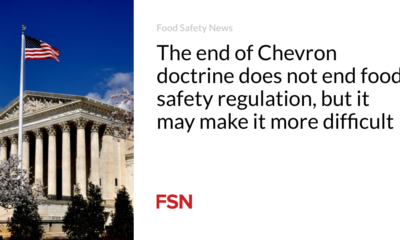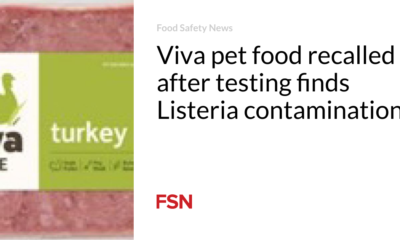Food
World Food Safety Day: Looking at NSF’s Critical Role in Shaping Standards and Practices

— ADVERTORIAL —
On June 7, World Food Safety Day, we celebrate the incredible progress made in food safety and public health. Leading this mission is NSF (National Sanitation Foundation), a public health and safety organization. This World Food Safety Day, we’re taking a closer look at NSF’s history, achievements and ongoing commitment to public and environmental health.
NSF has been at the forefront of developing food safety standards in the United States for nearly 80 years. With its initial focus on food equipment standards, NSF has grown to play a central role in ensuring the safety of the food supply through a comprehensive and collaborative approach.
Historical significance and evolution
NSF was founded in 1944 by Walter F. Snyder, a supermarket worker in Ohio, who recognized the need for consistent sanitation and safety standards. Snyder, along with Dean Henry Vaughan and Professor Nathan Sinai of the University of Michigan School of Public Health, founded NSF to address critical public and environmental health issues through scientific research and collaboration.
Harold Chase, MPH, NSF director of government affairs, emphasizes the organization’s long-lasting impact. “NSF was founded with the mission to develop standards for food equipment to ensure they are designed and manufactured in a sanitary manner,” Chase said. In recent decades, the NSF quality mark has been recognized worldwide as a symbol of quality and safety. NSF standards ensure the safety of food, water and health products and inspire confidence among consumers, retailers and regulators alike.
In its evolution and growth, NSF has expanded its scope to address a wide range of food safety issues, adapting to new challenges and technological advances. “Our initial focus was on food equipment, but now we are involved in everything from auditing supply chains to certifying organic and other consumer-facing claims,” Chase said.
Collaborative approach at all regulatory levels
NSF’s influence extends beyond local health departments to state and federal levels. “We have strong relationships with health departments at all levels,” Chase said. “Our team is made up of former health inspectors who bring valuable insights and help us answer questions and provide advice on our standards.”
This multi-level engagement is critical in a fragmented regulatory landscape. “Food safety in the U.S. involves a variety of stakeholders, including regulators, manufacturers and consumers,” Chase noted. “NSF excels at bringing these groups together to develop and implement effective standards.”
An important aspect of NSF’s work is its interaction with the Food and Drug Administration (FDA) and other federal agencies. “We are working closely with the FDA as we implement the Model Food Code,” Chase explains. “Our goal is to ensure that the Food Code reflects the latest science and best practices to protect public health.”
Addressing the key challenges
One of the key challenges NSF faces is the fragmentation of the food safety system. “Ensuring all stakeholders are on the same page is essential,” Chase emphasizes. “We convene joint committees including regulators, industry representatives and consumers to discuss and address food safety issues.”
These committees are an integral part of NSF’s approach. “By building consensus, we can develop standards that are practical, scientifically sound and widely accepted,” Chase said. “This collaborative process ensures that the standards are robust and effective.”
NSF’s collaborative efforts extend globally, with major initiatives in several regions. “We audit the Global Food Safety Initiative (GFSI) and work with major brands on their food safety programs worldwide,” Chase explains. “Our goal is to maintain high standards across regions, benefiting consumers worldwide.”
Recent milestones and achievements
NSF’s recent achievements underscore its continued commitment to food safety. “In 2023, we certified our first customer worldwide for the Global Gap Responsible Farming Label,” says Chase. “We have also launched food equipment evaluation programs in Europe and India, designed to comply with local regulations.”
These initiatives reflect NSF’s mission to improve and protect human and planetary health. “Having strong standards and ensuring compliance is critical,” Chase said. “A standard is just words on paper unless it is strictly followed and assessed.”
NSF’s commitment to innovation is evident in the continued development of new programs and certifications. “We are constantly evolving to meet new challenges,” Chase noted. “For example, we have developed standards for emerging technologies and new food production methods so that they meet the same high safety standards as traditional methods.”
Promoting a food safety culture
Creating a culture of food safety is an important focus for NSF. “Education and training are critical,” Chase said. “We ensure food handlers understand best practices, such as separating preparation areas to prevent cross-contamination.”
NSF’s efforts to promote food safety culture extend to consumers. “Through our partnership with the Partnership for Food Safety Education, we are educating consumers on simple steps such as cleaning, separating, cooking and refrigerating,” Chase said. “These practices are essential to preventing foodborne illness.”
Chase’s personal connection to food safety underscores the importance of these efforts. Growing up in northern Michigan, where his father headed the local health department, Chase was exposed to the importance of food safety early on. “I started washing dishes at a young age and later became a chef,” Chase recalls. “Watching health inspectors check the NSF seal on equipment was a formative experience and emphasized the importance of our work.”
Global perspective on food safety
NSF’s work is not limited to the US. “We are involved in global food safety initiatives, conduct GFSI audits and work with global brands,” said Chase. “Our goal is to ensure consistently high standards across different regions.”
Chase emphasized the importance of water quality for food safety, especially in emerging markets. “Clean water is critical for safe food production,” he said. “We work with global partners to ensure that the water used in food production is safe.”
NSF’s global reach includes partnerships with organizations such as the World Health Organization (WHO) and involvement with international standards bodies. “We are a Pan-American Health Organization and a WHO Collaborating Center on Food Safety, Water Quality and Medical Device Safety and an Observer for Codex Alimentarius,” Chase said. “These roles allow us to contribute to global food safety standards and practices.”
Looking forward
As NSF continues to expand its global reach, the organization remains focused on addressing emerging food safety challenges. “We are committed to improving and protecting the health of people and the planet,” said Chase. “Our work ensures that food safety standards are not only set but also strictly enforced, benefiting consumers worldwide.”
NSF’s continued commitment to food safety, driven by a collaborative and comprehensive approach, underscores its critical role in protecting public health. Through the dedication of professionals like Harold Chase and the collective efforts of various stakeholders, NSF remains at the forefront of setting and enforcing high food safety standards.
In addition to its food safety initiatives, NSF maintains close ties with academic institutions to foster the next generation of public health professionals. “Our president and CEO serves on the advisory board of the University of Michigan School of Public Health,” Chase said. “We also have a scholarship program to support students pursuing a career in public health.”
NSF’s involvement with educational institutions extends to hands-on training and collaboration. “We have hosted students from Michigan State University’s food safety program for laboratory visits and hands-on learning experiences,” Chase said. “These initiatives are part of our broader mission to cultivate future leaders in food safety.”
Building a resilient food safety network
NSF’s approach to food safety is holistic and addresses every aspect of the food supply chain. “From food equipment design and manufacturing to consumer education, we cover all the bases,” Chase said. “Our work with coalitions and partnerships ensures we can tackle complex challenges effectively.”
One such coalition is the Alliance for a Stronger FDA, which advocates for adequate resources for the FDA to fulfill its mission. “We believe in the importance of a strong and vibrant FDA,” Chase said. “Our membership in the Alliance reflects our commitment to supporting robust regulatory frameworks.”
NSF’s commitment to food safety is reflected in its continued efforts to improve and innovate. “We are always looking for ways to improve our standards and practices,” Chase said. “Whether through new certifications, global partnerships or educational initiatives, we strive to stay ahead of emerging challenges and protect public health.”
NSF’s comprehensive approach to food safety, from local inspections to global standards, illustrates its critical role in protecting public health. With a history of innovation, collaboration and education, NSF continues to set the standard for food safety standards worldwide. Through the efforts of dedicated professionals, NSF remains committed to ensuring that food safety is maintained at every level, benefiting consumers and promoting a culture of safety and awareness.
(To sign up for a free subscription to Food Safety News,Click here)













